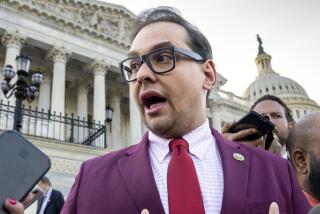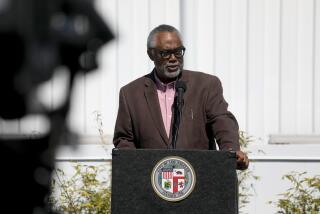Meese Violated No Rules, Says Ethics Director
- Share via
WASHINGTON — The government’s chief ethics officer today said Atty. Gen.-designate Edwin Meese III did not break ethics rules, and an assistant who had initially concluded there were violations said, “I probably misconstrued the facts.”
Director David H. Martin of the Office of Government Ethics, appearing at Meese’s confirmation hearing, told the Senate Judiciary Committee he was “totally satisfied that Meese was in compliance with conflict-of-interest laws.”
Martin, a Reagan appointee, said, “I had no pressure from anyone regarding this matter,” including presidential counselor Meese, his attorneys or White House counsel Fred Fielding.
Report Offered for Study
Martin’s conclusion of no violation came after he showed his assistants’ preliminary report to Fielding and permitted Meese’s lawyers to file a formal response.
But the director insisted “it’s my standard practice” to contact an agency’s ethics officer--Fielding in the case of the White House--and to allow an employee or his attorney to respond to allegations.
Three days ago, the senators learned that two of Martin’s staff lawyers, F. Gary Davis and Nancy Feathers, concluded in a Jan. 14 internal document that “there are two situations in which Mr. Meese violated the standards of conduct or other applicable statutes.”
Martin never mentioned the document when he told the committee Jan. 24, “We believe Mr. Meese is in compliance with applicable laws and regulations governing conflicts of interest.”
Concerned About Jobs
The ethics office mainly was concerned with the federal jobs obtained by two men who helped Meese financially--John R. McKean, chairman of the U.S. Postal Service Board of Governors, and Thomas Barrack, a former Interior Department official who used some of his own money to get Meese’s California home sold.
Martin, Davis and Feathers said today they agreed that Meese had an “appearance” problem. But Martin said the portion of an executive order that prohibits even the “appearance” of conflict is simply “aspirational”--something government workers should strive to achieve.
Davis, quizzed repeatedly about the internal report, said, “I probably misconstrued the facts.”
More to Read
Get the L.A. Times Politics newsletter
Deeply reported insights into legislation, politics and policy from Sacramento, Washington and beyond. In your inbox twice per week.
You may occasionally receive promotional content from the Los Angeles Times.










